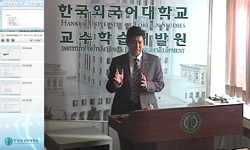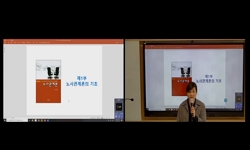Vargas, came to power by revolution in 1930, implemented policies based on Corporatism. The policy of Vargas government was rooted in the apprehensions of the time. There were two main proposes why his interim government chose Corporatism: resolving p...
http://chineseinput.net/에서 pinyin(병음)방식으로 중국어를 변환할 수 있습니다.
변환된 중국어를 복사하여 사용하시면 됩니다.
- 中文 을 입력하시려면 zhongwen을 입력하시고 space를누르시면됩니다.
- 北京 을 입력하시려면 beijing을 입력하시고 space를 누르시면 됩니다.
https://www.riss.kr/link?id=A107038086
- 저자
- 발행기관
- 학술지명
- 권호사항
-
발행연도
2020
-
작성언어
-
-
주제어
바르가스 ; 조합주의 ; 노동조합 ; 중앙집권화 ; 가부장제 ; Vargas ; Corporatism ; Trade Union ; Centralization ; Patriarchism
-
KDC
300
-
등재정보
KCI등재
-
자료형태
학술저널
-
수록면
39-60(22쪽)
-
KCI 피인용횟수
0
- 제공처
-
0
상세조회 -
0
다운로드
부가정보
다국어 초록 (Multilingual Abstract)
Vargas, came to power by revolution in 1930, implemented policies based on Corporatism. The policy of Vargas government was rooted in the apprehensions of the time. There were two main proposes why his interim government chose Corporatism: resolving problems between the capitalists and workers and establishment of strong central government by centralization. Vargas government made use of Trade Union not only to appease discontents of workers and to improve poor working conditions but to strengthen centralization of political power. At the beginning of the twenties, the vested interests were overcome with apprehensions of social overthrow due to the Russian Revolution. Adopting corporatism, Vargas government executed pro-workers preemptive measures to control working class. Besides this, Vargas government was obliged to carry out pro-workers policy because his government against traditional coffee nobility - then ruling capitalist class- needed urban working class and newly raising bourgeoisie class as its political supports to stabilize the regime. Based on corporatism, Vargas government should fatally be a centralized one. Vargas and his followers made use of trade union they organized and controlled as an official structure under the Labor Ministry to establish the strong central government weakening the powers of state governments. Since the establishment of the federative republican government, there was no nation wide hierarchical controlled organization in Brazil. Trade Union under Labor Ministry was, in this sense, very useful tool to realize centralization. However, the acceptability of corporatism in Brazil. The basic idea of Vargas on Trade Union had been lasted even in the following periods of democratized civil governments. The acceptability of corporatism is related with Brazilian unique patriarchism.
참고문헌 (Reference)
1 이승용, "빌라로보스의 생애와 음악" 22 (22): 25-34, 2003
2 최영수, "브라질사" 한국외국어대학교 출판부 2010
3 이승용, "브라질 부패와 가부장제" 한국 포르투갈-브라질 학회 14 (14): 45-64, 2017
4 "https://www1.folha.uol.com.br/fsp/dinheiro/fi1510200905.htm"
5 "https://www.shrm.org/resourcesandtools/legal-and-compliance/employment-law/ pages/global-brazil-unions-after-labor-reform.aspx"
6 "https://www.irishtimes.com/news/world/cult-of-comte-s-positivism-claims-key-role-in- brazil-1.2051387"
7 "https://www.hofstede-insights.com"
8 "https://www.dw.com/pt-br/h%C3%A1-50-anos-brasil-deixava-de-ser-estados-unidos-do- brasil/a-37946427"
9 "https://thebrazilbusiness.com/article/labor-unions-in-brazi"
10 Cyrol Lynch, "The culturalist conservatism of Gilberto Freyre : Society, Decline and Social Change in Sobrados e Mucambos (1936)" 7 (7): 879-903, 2017
1 이승용, "빌라로보스의 생애와 음악" 22 (22): 25-34, 2003
2 최영수, "브라질사" 한국외국어대학교 출판부 2010
3 이승용, "브라질 부패와 가부장제" 한국 포르투갈-브라질 학회 14 (14): 45-64, 2017
4 "https://www1.folha.uol.com.br/fsp/dinheiro/fi1510200905.htm"
5 "https://www.shrm.org/resourcesandtools/legal-and-compliance/employment-law/ pages/global-brazil-unions-after-labor-reform.aspx"
6 "https://www.irishtimes.com/news/world/cult-of-comte-s-positivism-claims-key-role-in- brazil-1.2051387"
7 "https://www.hofstede-insights.com"
8 "https://www.dw.com/pt-br/h%C3%A1-50-anos-brasil-deixava-de-ser-estados-unidos-do- brasil/a-37946427"
9 "https://thebrazilbusiness.com/article/labor-unions-in-brazi"
10 Cyrol Lynch, "The culturalist conservatism of Gilberto Freyre : Society, Decline and Social Change in Sobrados e Mucambos (1936)" 7 (7): 879-903, 2017
11 Armando Bonito Jr, "The State and Trade Unionism in Brazil" 21 (21): 7-23, 1994
12 Joel Wolfe, "The Faustian Bargain Not Made: Getúlio Vargas and Brazil‘s Industrial Workers, 1930-1945" 31 (31): 77-95, 1994
13 Maria Helena Moreira Alves, "State and Opposition in Military Brazil" University of Texas Press 2014
14 Roberto DaMatta, "O que é o Brasil?" Editora ROCCO 2004
15 Jorge Caldeia, "História do Brasil" Companhia das Letras 1997
동일학술지(권/호) 다른 논문
-
브라질 볼소나로정부의 외교정책: 창조적 파괴인가 파괴적 창조인가?
- 한국포르투갈-브라질학회
- 조희문 ( Hee-moon Jo )
- 2020
- KCI등재
-
- 한국포르투갈-브라질학회
- ( Juliano Paiva Junho )
- 2020
- KCI등재
-
- 한국포르투갈-브라질학회
- 김영석 ( Kim Young-seok )
- 2020
- KCI등재
분석정보
인용정보 인용지수 설명보기
학술지 이력
| 연월일 | 이력구분 | 이력상세 | 등재구분 |
|---|---|---|---|
| 2023 | 평가예정 | 재인증평가 신청대상 (재인증) | |
| 2020-01-01 | 평가 | 등재학술지 선정 (재인증) |  |
| 2019-12-01 | 평가 | 등재후보로 하락 (계속평가) |  |
| 2016-03-23 | 학회명변경 | 한글명 : 한국 포르투갈-브라질 연구 -> 한국 포르투갈-브라질 학회 |  |
| 2016-02-17 | 학회명변경 | 한글명 : 한국 포르투갈-브라질 학회 -> 한국 포르투갈-브라질 연구영문명 : Korean Association of Luso-Brazilian Studies -> Korean Association of Lusophone Area Studies(KALAS) |  |
| 2016-02-17 | 학술지명변경 | 외국어명 : Portuguese-Brazilian Studies -> Journal of Lusophone Area Studies |  |
| 2016-01-01 | 평가 | 등재학술지 선정 (계속평가) |  |
| 2015-12-01 | 평가 | 등재후보로 하락 (기타) |  |
| 2011-01-01 | 평가 | 등재학술지 선정 (등재후보2차) |  |
| 2010-01-01 | 평가 | 등재후보 1차 PASS (등재후보1차) |  |
| 2009-05-07 | 학회명변경 | 영문명 : Korean Society of Portuguese-Brazilian Studies -> Korean Association of Luso-Brazilian Studies |  |
| 2008-01-01 | 평가 | 등재후보학술지 선정 (신규평가) |  |
학술지 인용정보
| 기준연도 | WOS-KCI 통합IF(2년) | KCIF(2년) | KCIF(3년) |
|---|---|---|---|
| 2016 | 0.17 | 0.17 | 0.17 |
| KCIF(4년) | KCIF(5년) | 중심성지수(3년) | 즉시성지수 |
| 0.16 | 0.14 | 0.566 | 0 |




 KCI
KCI KISS
KISS






